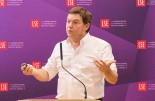Joeri de Wilde: Dancing to the tune of American big business
Joeri de Wilde: Dancing to the tune of American big business

This column was originally written in Dutch. This is an English translation.
By Joeri de Wilde, Senior Economist at Triodos Investment Management
The American shareholder model is becoming increasingly influential, now also for Dutch music festivals. As long as we fail to protect our cultural institutions, attempts at strategic autonomy are futile.
Commotion in festival land. Following an article by Follow the Money, several artists canceled their performances at festivals such as Zwarte Cross, Awakenings, and DGTL. The reason: private equity firm KKR is calling the shots after acquiring Superstruct Entertainment last year, a company that organizes eighty festivals across Europe. KKR not only invests in festivals, but also in Israeli data centers, infrastructure, and companies linked to Israeli settlements. In light of the genocide in Gaza, artists want nothing to do with that company.
But the problem goes beyond KKR. In recent years, American big business has become deeply entrenched in the Dutch festival scene. The most important player in this is Live Nation, the largest organizer of concerts and festivals in the world, responsible in the Netherlands for Pinkpop and Lowlands, among others.
American predatory capitalists
Live Nation's largest shareholder is Liberty Media. Founder John Malone is affiliated with the Cato Institute, a libertarian think tank that, for example, strongly opposes climate legislation. A connection with the progressive roots of many festivals seems far-fetched here. Other prominent shareholders include BlackRock and Vanguard. A familiar pattern is unfolding here: American asset managers are gaining increasing influence, which is worrying because they are solely focused on maximizing profits. This was already evident from their departure from the green climate alliance Net Zero Asset Managers and their voting behavior at shareholder meetings, where they rarely support social or ecological proposals.
We should not expect anything from KKR. Their business model revolves around buying up, restructuring, and reselling at a profit—culture plays no role whatsoever.
Cultural breeding ground in danger
This American ownership is at odds with the values that many Dutch festivals once stood for: diversity, local roots, and providing a breeding ground for subcultures and social dissent. Festivals themselves also feel that this is a problem. After the news about KKR broke, they quickly distanced themselves from their owner and emphasized that shareholders have no influence on content.
But that seems illusory. Sooner or later, the gospel of profit maximization will seep through shareholder meetings. This is already evident in rising ticket prices, programming that focuses primarily on big crowd pullers, and a growing dependence on sponsorship and influencer marketing. Festivals are becoming platforms for advertisers, resulting in uniformity. Small, independent festivals can hardly compete with this anymore.
Culture as a strategic interest
In the current geopolitical context, it is particularly ironic that our festivals have become so dependent on American shareholders. Brussels talks about strategic autonomy in energy, defense, and technology, but forgets the cultural dimension. Culture determines the stories we tell, the identity we cherish, and how we relate to the world. If we literally and figuratively dance more and more to the tune of American shareholders, it will be at the expense of our own European course.
Instead of engaging in symbolic politics, for example by demanding more Dutch-language music on the radio, right-wing parties should take a look at cultural subsidies through this lens. By keeping festivals independent, we protect cultural diversity and our own European identity. Cultural subsidies are therefore not a ‘left-wing hobby,’ but an investment in strategic autonomy. Just a reminder for the next (right-wing) government.










